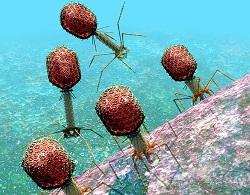Virus News: Swiss Study Warns That Pathogenic Viruses Are Evolving And Could Become Harder To Kill
Source: Virus News Sep 24, 2020 5 years, 4 months, 1 week, 4 days, 2 hours, 16 minutes ago
Virus News: Researchers from the Swiss Federal Institute of Technology-Lausanne (EPFL) in a new study shows that pathogenic viruses may be able to develop resistance to warm temperatures and certain some types of disinfectant such as chlorine. That combined with global warming and more frequent and longer heat waves could make it even harder to keep them from spreading.

The study team said that sunlight, temperature, and microbial grazing are among the environmental factors promoting the inactivation of viral pathogens in surface waters.
Globally, these factors vary across time and space. The persistence of viral pathogens, and ultimately their ecology and dispersion, hinges on their ability to withstand the environmental conditions encountered. To understand how virus populations evolve under changing environmental conditions, the study team experimentally adapted echovirus 11 (E11) to four climate regimes.
They specifically, incubated E11 in lake water at 10 and 30 °C and in the presence and absence of sunlight. Temperature was the main driver of adaptation, resulting in an increased thermotolerance of the 30 °C adapted populations, whereas the 10 °C adapted strains were rapidly inactivated at higher temperatures.
This study finding is consistent with a source–sink model in which strains emerging in warm climates can persist in temperate regions, but not vice versa. A microbial risk assessment revealed that the enhanced thermotolerance increases the length of time in which there is an elevated probability of illness associated with swimming in contaminated water.
Significantly, 30 °C-adapted viruses also exhibited an increased tolerance toward disinfection by free chlorine. Viruses adapting to warm environments may thus become harder to eliminate by common disinfection strategies.
The study findings were published in the journal: Environmental Science and Technology.
https://pubs.acs.org/doi/10.1021/acs.est.0c03199
The study team says that we could soon see the day when individuals have to think twice before taking a swim in lakes hitherto considered healthy. That’s because some of the pathogenic viruses on the water’s surface could evolve to become more resistant, as an indirect consequence of global warming and the increase in the number of heat waves and record-breaking temperatures.
Normally most of the pathogenic viruses in lakes are naturally rendered harmless by sunlight, warm temperatures and bacteria normally present in the water.
However a team of scientists at EPFL’s Environmental Chemistry Laboratory (LCE) has found that some human enteroviruses which can cause gastro-intestinal infections or severe diseases such as meningitis, and are found in feces, meaning they could make their way into wastewater effluent may have the capacity to adapt to higher water temperatures.
The study team created four human enterovirus populations by incubating samples in lake water at 10°C and 30°C in both the presence and the absence of sunlight. They found that the viruses surviving in the warmer water became increasingly resist
ant to temperature, unlike those in the colder water.
Co-lead researcher and corresponding author DrTamar Kohn, an Associate Professor at EPFL and head of the LCE told Thailand Medical News, “We then exposed the surviving viruses to chlorine and found that they had also become more resistant to chlorine-based disinfectants. That means viruses with the ability to survive in warm water may also be more difficult to kill with standard water treatment processes.”
Importantly, the chances of resistant viruses traveling from one world region to another are growing as a result of globalization, since people and goods (like fruits and vegetables), which could potentially be contaminated, are moving about more readily. For example, a pathogen that is perfectly adapted to the warm water of an equatorial region could inadvertently be carried into Switzerland, where it is likely to survive for a long time because it would be resistant to the ambient temperatures. This would heighten the risk of the virus spreading a benign disease or a more serious one like polio.
Dr Kohn adds, “The other implication of our study is that if temperatures rise, there could be more world regions where viruses develop this capability to resist.”
That wouldn’t be a direct consequence of global warming because even a 3°C rise would be too small to make a difference but of an increase in the number of long heat waves.
The research team next plan to test their findings in a series of field experiments.
The study findings also have implications for the COVID-19 pandemic as already huge amounts of the SARS-CoV-2 coronavirus are being found in waste water supplies and already the virus has been able to withstand a wide range of conditions.
As coronaviruses are found to be able to evolve and mutate faster that other viruses, more attention has to be paid to such possible developments.
For more
Virus News, keep on logging to Thailand Medical News.
